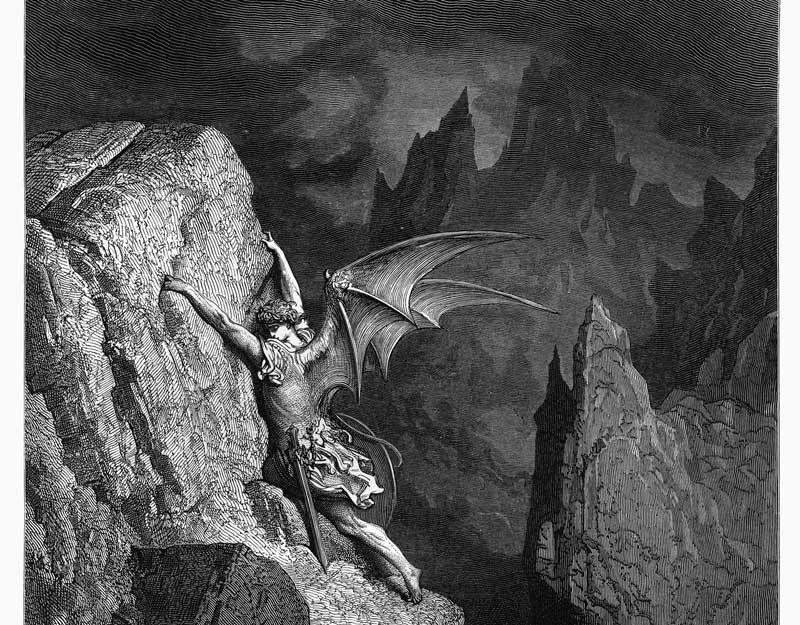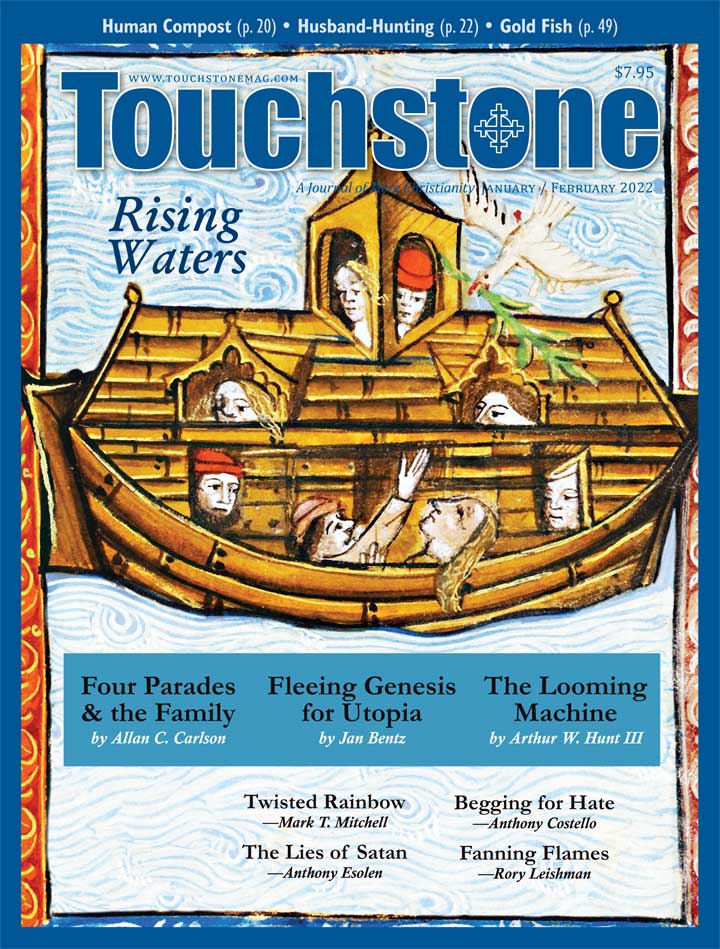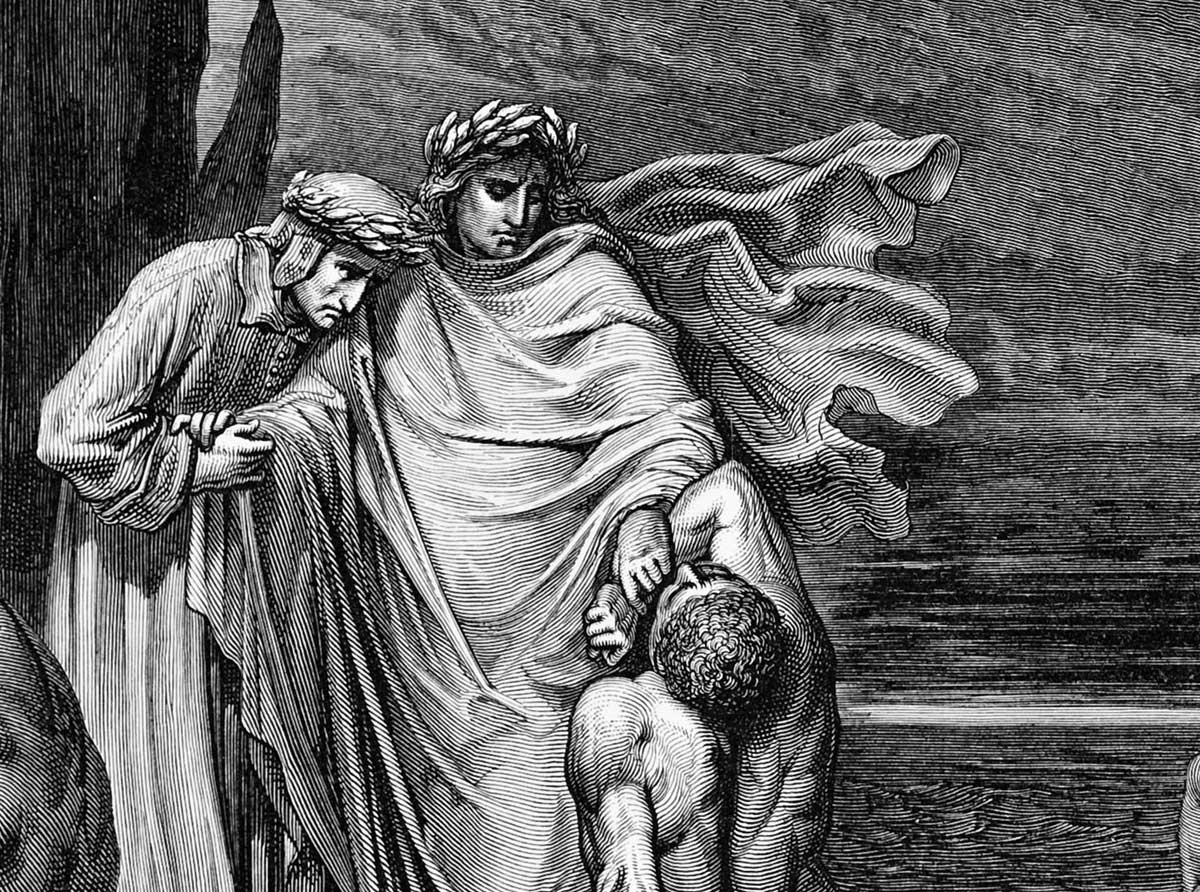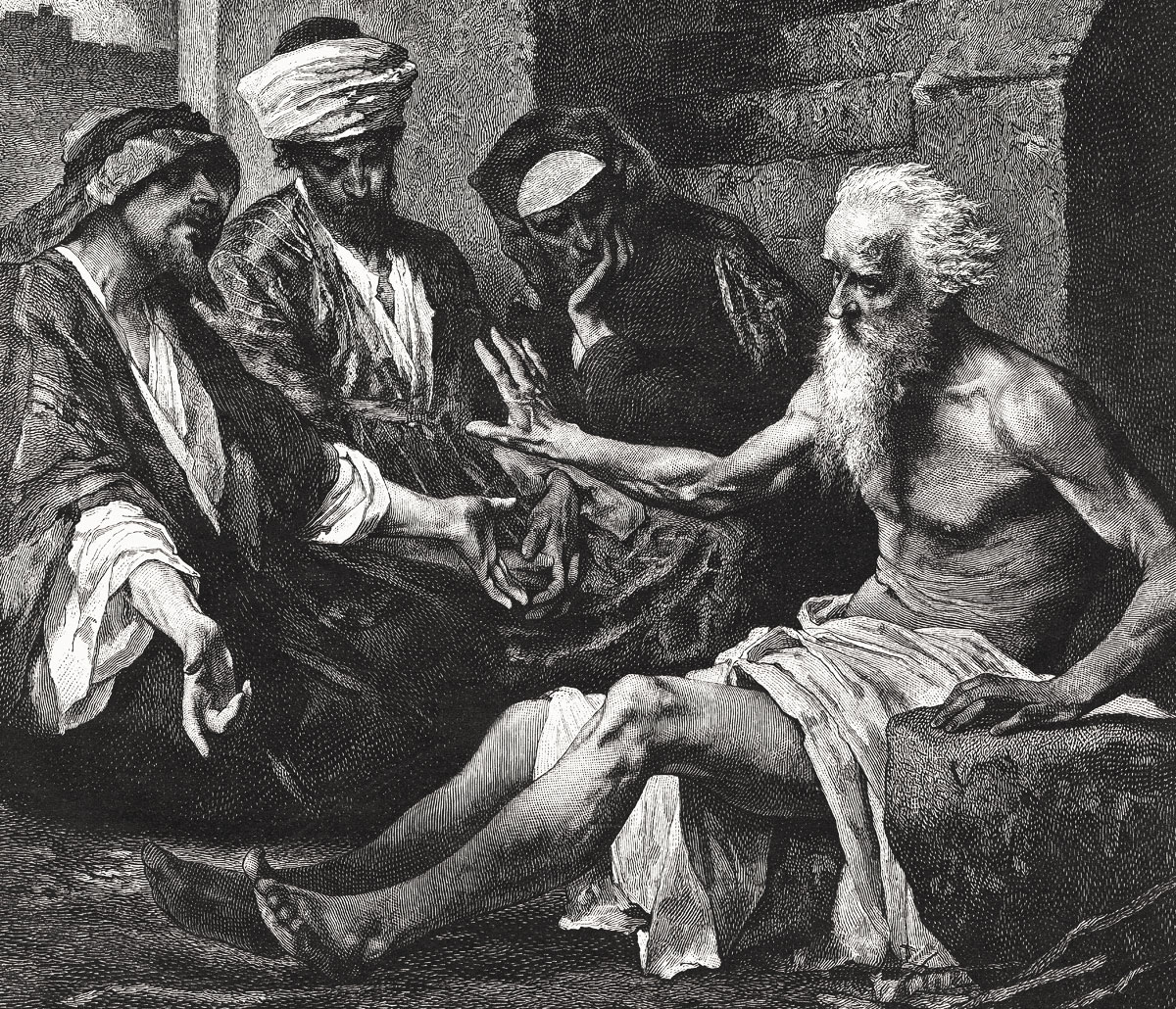A Liar & the Father of Lies
Milton's Satan & the Confusion of the Mind
by Anthony Esolen
"Why do you not know my speech?" Jesus asked of the Pharisees, who had already witnessed the wonders he wrought, though they did not greet them with wonder, or even childlike delight. "Because you cannot hear my word," he answers. "You are of your father the devil," that is, the Accuser. "He was a murderer from the beginning, and he stood not in the truth; because truth is not in him. When he speaketh a lie, he speaketh of his own; for he is a liar, and the father thereof" (John 8:43–44).
There are two sorts of people who do not hear the words of Jesus. There are those who have never heard them, and they include many in our midst who believe they have heard them—vaguely, loosely, merely as rumors, and often not reliable. And there are those who have set themselves against those words. We dare not judge the individual case, but it is a wholly different matter if we are talking about a culture, or the remains of a culture, or a civilization. Then we must ask whether that people, most miserable, and making misery for others, have given themselves over to the lie.
Here I recall the shrewd words of Whittaker Chambers at the beginning of Witness, when he is describing for his children, who he hopes will read the book someday, what Communism is. Chambers says it is not the dictatorship of the proletariat, or the collectivization of farms, or anything else identifiably political or economic. Communism is, he says, the world's second-oldest religion, summed up in the words of Satan, the murderer "from the beginning," by which Jesus does not simply mean "a long time ago." Satan is the anti-creator, the murderer, the destroyer, the accuser, who says to Eve, "Ye shall be as gods" (Gen. 3:5).
That is more than an alternative idea about the created order. The very notion of creation is at stake: either we have a created order, which implies a Creator and which calls us to gratitude and to a harmonious acceptance of that order, even as man is God's viceroy and the chief of the physical universe, or we do not have a created order, and then we play at being gods ourselves. Nature is mere stuff to dominate, and that means, practically speaking, as C. S. Lewis says in The Abolition of Man, that either man dominates Nature by using other men as the tools, or man subjects himself to be dominated, because he bears no more inherent meaning than does a horse, or a tree, or the dirt beneath his feet. The lie is put in the service of violence. That is what the lie is for.
All Sin in One Lie
How do I deceive thee? Let me count the ways. Here I will enumerate four of them, as manifest in John Milton's Paradise Lost: four objects of false witness. In each case, I will describe at least one way in which the West that has rejected Jesus utters such lies, at the expense of human life, and often precisely to destroy human life.
But first let me stress that the line, "Ye shall be as gods," is more than a bit of trickery. That lie contains within itself all sin, all evil: it breaks all the commandments at once.
It is an act of idolatry: self-worship, an abasement, in place of the sublime worship of God. It takes the name of God in vain; Satan has reduced the sacred plural Elohim, a name that mysteriously suggests the plenitude of God, and that Christians believe is an intimation of the Trinity, into any old plural, a reduction of God to a creature. It is directly opposed to the calm and joyful rest of the Sabbath; it says, "Do this, do this right now, and you shall have power to do much more."
It is impiety against the Father. It is murderous, and indeed murder is the first sin we are told of after Adam and Eve are expelled from the garden; it would gladly hail the death of God. It is a lust for strange flesh: as if some created thing could delight, in the place of the God who made Adam and who gave Eve to him as his helpmeet; and we see the sadness of bodily shame in the aftermath of this lust. It is theft, because the fruit of the tree is not theirs to eat. It is false witness against God—whom Satan portrays as petty, envious, not desirous of the best for the human couple.
It is coveting, with a vengeance. Satan does not simply want Eve to eat the fruit. He wants her to long to eat it: "And the woman saw that the fruit was good to eat, and fair to the eyes, and delightful to behold" (Gen. 3:6). And the rest of Genesis is a saga of the corruption of human desire, most clearly evident in the many ways we get procreation wrong. Man, we may say, is corrupted in the seed.
Lies About Reality
Man tells lies about reality: he sets himself against other created things. Milton's Satan knows that the created world is ravishingly beautiful—as he admits when no one is around to hear him:
With what delight I could have walked thee round,
If I could joy in aught, sweet interchange
Of hill and valley, rivers, woods, and plains,
Now land, now sea, and shores with forests crowned,
Rocks, dens, and caves; but I in none of these
Find place or refuge; and the more I see
Pleasures about me, so much more I feel
Torment within me, as from the hateful siege
Of contraries; all good to me becomes
Bane, and in heaven much worse would be my state.
Yet when he insinuates himself into the body of the snake to tempt Eve, he expresses scorn for this same material world. So he says to Eve, as he makes intricate the way to her loss:
I was at first as other beasts that graze
The trodden herb, of abject thoughts and low,
As was my food, nor aught but food discerned,
Or sex, and apprehending nothing high.
He was just another snake, he says, until he ate of a certain fruit, and if the fruit made a rational creature out of a snake, it can make an angel, or a god, out of man. Notice how broadly aimed the scorn is. What, after all, should a snake think about, if not food and sex? That is to think in a way proper to snakes and their lives. Satan implies here that it is contemptible to be a snake, but so then must it be contemptible to be only human, when you can be so much more.
Satan has betrayed disgust—but not when Eve is near—for his having to adopt the body of the snake in the first place. His use of that body as a convenient vehicle is a parody of the incarnation of Christ, and it is marked by a prissy contempt for fleshly reality:
O foul descent! That I who erst contended
With gods to sit the highest, am now constrained
Into a beast, and mixed with bestial slime,
This essence to incarnate and imbrute,
That to the height of Deity aspired.
"He who exalts himself shall be humbled," says Jesus, and we should think of it not as a prediction but as an inexorable law of being: when, in scorn for your place in the created order, you attempt to overleap what you are, you fall; man as a pretended god is a beast. Or perhaps lower than a beast. Adam and Eve are the original technocrats. They believe that if they use the fruit of the tree as a tool, they will be as gods. That apple's flesh must contain the right nutrients for deity.
So we become the tools of our tools. You may ask whether this denial of the created order is evident in our time, seeing that we love to stand on bridges in state parks and take pictures of the streams below; nor do we pollute the world with the same kinds of filth we used to pollute it with when I was a boy, when the sight of piles of coal flakes, several hundred feet high, greeted my eyes every time I walked outside. But consider, in our time, the deep hatred of the physical meaning of sex, the child-making act. The Pill is the apple. Take it, submit to the pharmacy and its wizardry, and ye can be as gods. Forget that what you are doing makes babies.
And forget the babies. What is developing in the woman's womb? The "bestial slime" that disgusts Satan is for us, thinking of the child we do not want, a "clump of cells," a "wart," a "parasite." Objectively speaking, biologically speaking, it is not an indiscriminate clump or a wart or a parasite; it is breathtakingly beautiful and human. But we tell the lie, and heave the child out of the way. Indeed, a deep hatred of male and female nature characterizes many of our diseases: think of the now-celebrated mutilation of healthy bodies, or think, to bring more death into the picture, of women in combat, at no profit to themselves, to the men beside them, or to their country.
Lies About Others
Then there are lies aimed against others. In Paradise Lost, Satan must tell himself and the other devils lies about the unfallen angels, because otherwise the senselessness of their revolt and their loss would overwhelm them—and would jeopardize Satan's preeminence over his followers. So when he has been caught trying to disturb the peace of Adam and Eve, Satan tries to put on a bold front before the angel Gabriel, who has been on the lookout for him. He says he is there to scout out a better place than hell for his comrades,
To settle here on earth, or in mid air;
Though for possession put to try once more
What thou and thy gay legions dare against;
Whose easier business were to serve their Lord
High up in heaven, with songs to hymn his throne,
And practiced distances to cringe, not fight.
That is a flat lie, and Satan knows it. He has accused Gabriel and all the faithful angels of cowardice, implying that they are good only for singing and dancing, and—note well—not worshiping genuinely, but cringing. To this original hypocrite, everyone else must be a hypocrite, too. A hypocrite, or a coward, or both at once.
So Satan flings this insult at Abdiel, the lone angel among his cohorts who has rejected his leader's lies and turned back courageously to God, while all the others were hissing and jeering at him. Satan and Abdiel face each other as the war in heaven is about to begin. The insult touches Abdiel and everyone who remains faithful to God:
At first I thought that liberty and heaven
To heavenly souls had been all one; but now
I see that most through sloth had rather serve,
Ministering spirits, trained up in feast and song;
Such hast thou armed, the minstrelsy of heaven,
Servility with freedom to contend,
As both their deeds compared this day shall prove.
Of course their deeds prove far otherwise, but that is not my point here. Notice that when you give yourself up to sin, and it begins to do its hellish work within you, you must either repent, or you must tell a lie about the sin. At first, that lie may persuade you; think of the heady days of the sexual revolution, when people were encouraged to disrobe themselves of decency and faithfulness and the fruitfulness of the body, and then all would be sweetness and light. The sweetness and light did not ensue. Misery did; so now we must lie about those who keep faith.
Our media rejoice far more when one member of a Christian church falls into grave sin than for the ninety-nine miserable people among them who have long yielded to the sin and gotten no great good from it. No television show will praise anyone who leaves the world to join with the Amish, or anyone who leaves a life of sad hedonism to be married and to have children after the ordinary way of nature. The audience wants to see spiritual death instead. Misery, with a lot of skin, sells.
Other than people of faith, whom do we now lie about the most? Our forefathers. We murder them. How strange, that we are eager to pull down statues! Healthy cultures do not do such things. Their people honor their forefathers, as far from perfection as they surely were.
If you want to spread gloom over the face of a feminist, prove that the married men of past generations in the United States—and almost everyone above the age of 25 was married—generally treated their wives with honor and tenderness, and that men despised other men, calling them cowards, who raised a hand in anger against a woman. Denounce the slander. Why is she not happy to learn that Grandpa was less of a cad than she had thought? Why do we want to believe the worst about men like Robert E. Lee or Stonewall Jackson?
If every man is to be judged by his worst sins in the worst light, we might as well get in line for the regions below, because that is where everyone is going. But we must lie about others because even we do not believe the flattering lies we tell about ourselves.
Lies About Ourselves
But then, my third category is simply that: we do tell lies about ourselves. Satan knows that he has led his host to misery, and he knows that he cannot overcome God. He knows also that his plan to ruin the lives of the newly created human couple will bring no benefit to him or to his comrades. But he cannot say so. Politics forces his hand. He must lie. Here he bids farewell to those mighty angels, before he leaves hell to seek more misery upon earth. Let them comb through hell to find something to alleviate the pain there, "while I abroad / Through all the coasts of dark destruction seek / Deliverance for us all."
Satan portrays himself as a "patron of liberty," but what really marks him is a pride that cannot bear even an equal, let alone a superior in the Son of God. So he, says Milton, "aspiring / To set himself in glory above his peers," shows himself on the first day of the war in heaven not as a republican leader, but as the god who would unseat God:
High in the midst exalted as a god
The apostate in his sun-bright chariot sat
Idol of majesty divine, enclosed
With flaming cherubim, and golden shields.
So, too, does he appear at the council in hell later on, when the devils assemble to determine what they should now do. Beneath the facade of a republican debate, the foregone conclusion has been set in place:
High on a throne of royal state, which far
Outshone the wealth of Ormus and of Ind,
Or where the gorgeous east with richest hand
Showers on her kings barbaric pearl and gold,
Satan exalted sat, by merit raised
To that bad eminence; and from despair
Thus high uplifted beyond hope, aspires
Beyond thus high, insatiate to pursue
Vain war with heaven. . . .
Such lies soak the earth in blood. Recall the words of Jesus, when his disciples were quarreling about who among them was the greatest: "The kings of the Gentiles lord it over them, and they that have power over them are called benefactors. But it is not to be so among you" (Luke 22:25–26). Call this the eleventh plague of Egypt, the plague of the benefactors: Lenin, Stalin, Hitler, Mao, Che Guevara, Fidel Castro, and innumerable other bringers of salvation great and small, and everyone among us who plays the part of a hanger-on, a tool, a cheerleader, a patsy—all who bask in the glare of worldly greatness, who will gladly accept a lie about the great, in order to lie about themselves. There is no Alexander without the many millions who wish to share in the booty as micro-Alexanders.
Milton will have none of it. So the archangel Michael says to Adam, when he views what is in store for the societies that sinful man creates:
To overcome in battle, and subdue
Nations, and bring home spoils with infinite
Man-slaughter, shall be held the highest pitch
Of human glory, and for glory done
Of triumph, to be styled great conquerors,
Patrons of mankind, gods, and sons of gods,
Destroyers rightlier called and plagues of men.
Perhaps we are too effeminate now—despite the absurd and murderous push to make warriors of women—to pride ourselves on military conquest. But in our time, war slays his thousands, and lust slays his ten thousands—or perhaps I should say her ten thousands, or zir ten thousands, or whatever reality-denying and self-aggrandizing and grammar-vitiating pronoun you choose. Everyone can have his fifteen minutes of being an Alexander in lust, destroying people's lives all around, without requiring Alexander's courage or skill on the battlefield.
Lies About God
Finally, there are lies about God. All lies have God as the ultimate object, but some lies are direct assaults. "Our great Forbidder," the fallen Eve calls God, "safe with all his spies / About him"—the great Forbidder, who has given them the whole created world to enjoy and to embellish by their labor, and who requires of them no action but merely to refrain from eating of one tree. And the spies—those ministering angels, whom Satan himself has pretended to despise, as if it were beneath the angelic dignity to serve man.
But why stop at slandering God when you can deny him outright? "That we were formed then sayst thou?" Satan sneers at Abdiel, and in seeming to elevate his status, actually demotes it. Because if the angels have not been created by God, then they must be the results of natural and fatalistic development. They rose naturally and inevitably, let us say, from the celestial stew. Says Satan:
Who saw
When this creation was? Rememberest thou
Thy making, while the Maker gave thee being?
We know no time when we were not as now,
Know none before us, self-begot, self-raised
By our own quickening power, when fatal course
Had circled his full orb, the birth mature
Of this our native heaven, ethereal sons.
Why would man not want the tremendous honor of being a son of God? Because other men also would be sons, and then it would be hard to justify the miserable things you want to do to them. The child in the womb is made in God's image no less than Alexander was, no less than Simone de Beauvoir and Margaret Sanger were. A good son obeys the father and loves and respects his brothers, but when you want to rub your brothers into the dirt, or you want to rub yourself into the dirt, as did the son in Jesus' parable, you must break with the father. You must, in your heart, murder the father.
Here we see the inmost evil of all attempts to sell "change" as the one political and social thing to be desired. It is aimless and restless, and thus easy to condemn—but we should remember that the liar wants to murder, not to give life. Change, irritable and sickly change, in our time is a watchword for the denial of one's own duty to God, the denial of the humanity of every inconvenient human person, and the denial of the created order as something beautiful, something that claims our gratitude and honor. Happiness cannot be the aim, not when the mavens of change themselves evince none of it, but instead fill every public space with vulgarity, hatred, obscenity, ugliness, slander, suspicion, treachery, and ingratitude. Misery is the aim: a tower of misery, with men as the bricks.
An Opportunity
The towers the world builds no longer have even a superficial beauty to commend them; and here is an opportunity for us. Peace, says Saint Augustine, is the tranquility of order; and all human order that is worthy of honor is founded upon truth, and aspires to truth. Liars may have glare and flash, but no beauty. The lie is a garish tattoo, a defacement.
We must affirm the truth, not in mere defiance of the liar, but as lovers of the truth, as people moved by its beauty to produce works of beauty, and of any genuine freedom that man in this pilgrimage can know. In this aspiration, devoted to our good and the good of our enemies, let us in peace and confidence give ourselves wholly to him who is the way, the truth, and the life.
Anthony Esolen is Distinguished Professor of Humanities at Thales College and the author of over 30 books, including Real Music: A Guide to the Timeless Hymns of the Church (Tan, with a CD), Out of the Ashes: Rebuilding American Culture (Regnery), and The Hundredfold: Songs for the Lord (Ignatius). He has also translated Dante’s Divine Comedy (Random House) and, with his wife Debra, publishes the web magazine Word and Song (anthonyesolen.substack.com). He is a senior editor of Touchstone.
subscription options
Order
Print/Online Subscription

Get six issues (one year) of Touchstone PLUS full online access including pdf downloads for only $39.95. That's only $3.34 per month!
Order
Online Only
Subscription

Get a one-year full-access subscription to the Touchstone online archives for only $19.95. That's only $1.66 per month!
bulk subscriptions
Order Touchstone subscriptions in bulk and save $10 per sub! Each subscription includes 6 issues of Touchstone plus full online access to touchstonemag.com—including archives, videos, and pdf downloads of recent issues for only $29.95 each! Great for churches or study groups.
Transactions will be processed on a secure server.
more on literature from the online archives
more from the online archives
calling all readers
Please Donate
"There are magazines worth reading but few worth saving . . . Touchstone is just such a magazine."
—Alice von Hildebrand
"Here we do not concede one square millimeter of territory to falsehood, folly, contemporary sentimentality, or fashion. We speak the truth, and let God be our judge. . . . Touchstone is the one committedly Christian conservative journal."
—Anthony Esolen, Touchstone senior editor













